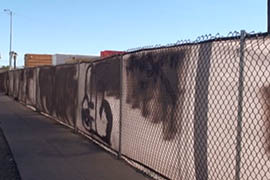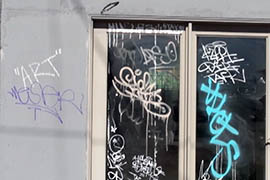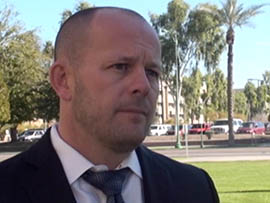Cronkite News has moved to a new home at cronkitenews.azpbs.org. Use this site to search archives from 2011 to May 2015. You can search the new site for current stories.
Lawmaker: To curb graffiti, ban sale of spray paint to minors statewide
PHOENIX – To Jo Marie McDonald, whose job is to enhance the quality of life in Phoenix, graffiti has become a “forever battle” costing cities across Arizona millions each year.
“It’s an economic disaster, it makes the community look like it’s not safe,” said McDonald, vice president of Phoenix Community Alliance.
In addition to programs such as Graffiti Busters, in which crews quickly remove graffiti from neighborhoods, a city ordinance makes it illegal for minors to possess graffiti implements and bans the sale or delivery of materials to minors.
But not every city has such a ban, and a state lawmaker says that inconsistency undercuts the efforts of those that do.
Rep. Chad Campbell, D-Phoenix, the House minority leader, wants a state law making the sale and possession of graffiti implements to minors illegal without consent from a parent, legal guardian, employer, teacher or other adult with a similar relationship to the minor.
“We need a statewide standard to deal with this so all communities are playing by the same rules and hopefully cut down on graffiti,” he said.
“The cities can implement their own standards, which the city of Phoenix has done, but neighboring cities may not follow those standards. All the kids really have to do is drive across city borders and get the implements somewhere else,” Campbell said.
HB 2243 defines a graffiti implement as an aerosol or pressurized paint container, a broad-tipped indelible marker, a solidified paint marker, an etching tool or a solution that may be used to commit a violation.
McDonald said her organization has supported legislation in the past aimed at curbing graffiti.
“It’s a real team effort; it’s the community working together, and that’s the important thing,” she said.
David Nash, public affairs coordinator for Yuma, said graffiti abatement costs the city more than $100,000 a year, which means taking funds away from other projects such as playgrounds and upgrading park facilities.
According to Nash, Yuma uses The Anti-Graffiti Strategy, also known as T.A.G.S., which involves more enforcement, education, awareness and keeping materials used for graffiti under lock and key.
“We make it pretty clear that this stuff is not supposed to be used in the incidents of graffiti,” he said.
The police department also keeps a database of tags and markings by offenders.
The strategy has helped to decrease the number of abatement cases from 2,588 in fiscal 2012 to 1,791 in fiscal 2013, he said.
Nash said he would be interested if the bill proposed giving victims the ability to collect restitution for labor as well as the materials used to cover up the vandalism, but he has concerns about how a state law would affect the city’s plan.
Tom Boughner, code compliance manager for Flagstaff, said graffiti is a very real issue in the city but that he isn’t interested in regulating retail sales of the materials.
Boughner said he didn’t think such a law would be effective and that it would be very difficult to enforce.
“Really it’s more of an inconvenience to customers than anything else,” he said.
Boughner said he would like to see a bill that allows the damage to be covered quickly, because graffiti will often attract other vandals.
“One of the best ways to fight it is to get it covered up between 24 and 36 hours,” he said.
Campbell’s bill would hold the juveniles responsible for paying full restitution and require them to perform community service. If a juvenile is unable to pay restitution, parents may be ordered to do so.
“We’re trying an all-of-above approach, and I think that’s the best way to try to address this,” Campbell said.
“It’s a plague on our communities, and we have to make sure we’re trying everything we can to stop it,” he said.










